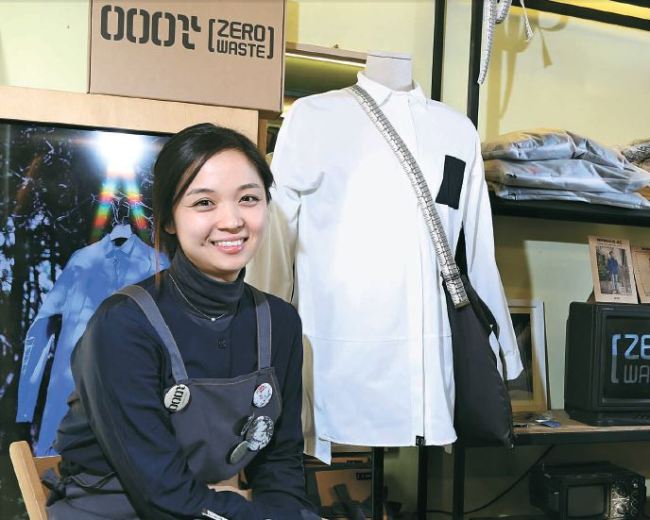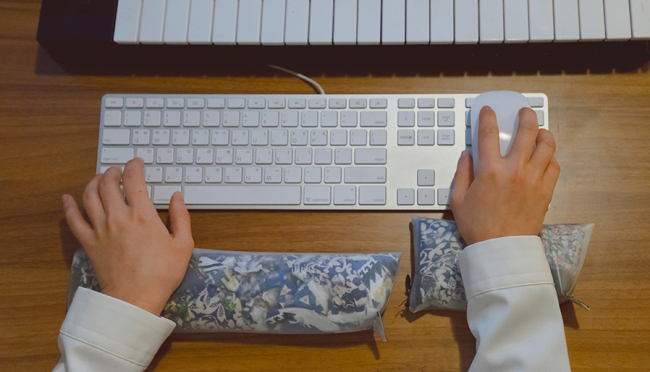[Eye] Zero Space seeks to create ethical fashion that appeals on design
CEO Shin Yun-ye on how ethical fashion can benefit consumers, the environment, producers and fashion companies
By Korea HeraldPublished : April 7, 2017 - 18:22
Starting from the heart of the buzzing Dongdaemun Fashion District in downtown Seoul, a brisk 15 minutes’ walk uphill through winding alleyways leads to a different, quieter world. The steep roads are lined with tiny garment factories marked by yellow triangular flags bearing their names.
“Best ladies’ apparel,” one flag proclaims. “30 years’ experience. Best quality for all clothes,” another boasts.
The neighborhood of Changsin-dong is where much of the clothing sold in Dongdaemun is quickly made to order and sent off in bundles on the backs of motorcycles and trucks each day.
When the motorcycles leave, the factories throw away their leftover fabric.
“They throw out twenty-two tons a day. That’s 8,000 tons a year,” explained 32-year-old Shin Yun-ye, the CEO of Zero Space. Her company is a small fashion startup nestled between the factories in Changsin-dong, working to produce high-quality clothing and home products that create as little waste as possible.
“Best ladies’ apparel,” one flag proclaims. “30 years’ experience. Best quality for all clothes,” another boasts.
The neighborhood of Changsin-dong is where much of the clothing sold in Dongdaemun is quickly made to order and sent off in bundles on the backs of motorcycles and trucks each day.
When the motorcycles leave, the factories throw away their leftover fabric.
“They throw out twenty-two tons a day. That’s 8,000 tons a year,” explained 32-year-old Shin Yun-ye, the CEO of Zero Space. Her company is a small fashion startup nestled between the factories in Changsin-dong, working to produce high-quality clothing and home products that create as little waste as possible.

Shin, an Asia-Pacific finalist for the Cartier Women’s Initiative Awards, is a fine artist by training. She first came to Changshin-dong in 2011 as part of an art volunteer program run by a large corporation for underprivileged children.
“While working with the program, my co-founder and I came to realize that simply running an arts program funded by a corporation was not doing much to actually help solve the problems faced by the people living here,” Shin said. “We thought about ways that we could use art to change real-life hardships.”
Shin and her Zero Space co-founder Hong Sung-jae first sought to create an arts community in the area to foster unity, but faced an icy reception.
“They just saw us as artists, outsiders who happened to be creating art in their neighborhood. We realized that in order to be truly accepted we needed to become their colleagues. Instead of people offering help, we wanted to become their partners. So we began our company.”
At first, Zero Space was launched as a company offering arts programs. But as Shin and Hong met with the parents of the children in their programs, they began to see serious structural problems with the fashion industry.
“The clothes that I could buy at such low prices in Dongdaemun were being created here, in the process producing tons of waste and terrible labor conditions,” she said.
“Telling people we wanted to be part of the community without fundamentally understanding those underlying problems seemed like a superficial approach. So we decided to make products as well, alternative products that could start a conversation about the fast-moving fashion cycle here.”
Creating zero waste products
Neither Shin nor Hong had ever been trained in fashion design, so they started with the simplest product they could think of: Cushions of various sizes made by stuffing leftover pieces of fabric into clear plastic pouches.
“After that, we started thinking even more fundamentally, about how we could reduce waste to begin with.”

Shin began seeking out the advice of local producers on creating a pattern for a minimal-waste shirt.
“We began asking around how clothes were made, how they were designed into patterns,” she said. “It was like a puzzle. We wanted to see how we could use every scrap, maybe for a pocket, even if the pocket shape was a little distorted.”
The first Zero Waste shirt was crowdfunded through Wadiz, and was a success.
“At first, the producers here didn’t want to help us. But once the shirt came out, they were surprised to see that people actually bought it. They were also proud, because this was really the first time that they had really been a part of the design process for a product,” Shin said.
Since then, Zero Space has produced fashion and lifestyle items sold through multi-brand shops like 10x10, 1300k and 1200m, malls like Common Ground, and offline shops. The products are designed by an in-house fashion designer, and Zero Space receives funding from corporations’ community contribution teams to finance its projects and products, in addition to their sales.
Since 2013, Zero Space has sold over 5,000 pieces. Revenues from consumer sales have grown from $28,000 in 2014 to $153,000 last year, and business sales have risen from $98,000 to $172,000.
Shin said that in order to increase distribution channels and sales, it was important for Zero Space to focus on design.
“If we ask people to buy our products because they were made with this great intention, they might buy from us once. For people to keep coming back, our products have to be attractive in and of themselves,” she said. “We can’t say that our products aren’t as good as existing brand products, but are worth it because of the social value. We have to compete on equal footing, and present our philosophy as an additional value.”
Marketing as consumer education
Shin considers Zero Space’s marketing to be an important way to increase awareness about the underlying issues in the fashion industry. “As long as consumer culture does not change, these problems in the production process are going to persist,” she said.
“If we do not create a movement among consumers, other companies will not change their stance. In the end, the question is how many consumers we can convince, how big of a cultural shift we can create. That’s our mission.”
In order to achieve that goal, Zero Space hopes to collaborate with other like-minded brands to draw consumers’ attention, such as through forums or joint markets.
“We are in a moment when we have to really think about our lifestyle. Clothes are being made in exploitative labor systems in other countries, but once those countries become developed, those factories are going to move again to another country. How long can we sustain that?” she said.
“That is what I want to explore most in zero waste research. If we give producers fair wages and raise labor costs, how can we reduce wasted fabric so that we can offset that difference? I believe that would be truly innovative, and if we find the answer, that process can be adopted by other companies as well.”
When asked to name the biggest hurdle to increasing ethical fashion, Shin answered without hesitation, “Price.”
“If you take a similar shirt from a fast fashion brand and our brand, ours is about 30,000 won more expensive,” she said. “That difference comes from the difference in the fabric, as well as research and development for zero waste.”
But, at the same time, she says that consumers are willing to pay for better quality.
“If fashion companies change their philosophy just a little, they can see that it’s beneficial to them. If they use non-toxic materials and consumer value to create products for a well-being life, that paradigm shift is possible,” she said. “In the short term, raising labor costs can cut into profitability. But in the long term, that will help them gain many more loyal consumers. In my opinion, that is the best way to ensure continued profitability.”
Shin acknowledges that higher prices may be prohibitive for younger consumers, but she sees possibility among older shoppers. Zero Space is currently working with personal care and household goods maker Yuhan-Kimberly to create products for seniors.
“The target is active seniors, senior citizens who have buying power and are interested in community contributions. We’re working together with Yuhan-Kimberly to offer our products as sustainable fashion for them, breaking preconceptions about the types of clothes that seniors wear,” she said.
Zero Space has worked mostly with community contribution teams at companies like Yuhan-Kimberly, Kakao and Hyosung until now, but Shin says that she is hoping to expand her business beyond these projects with the help of the Cartier Women’s Initiative Awards.
As a finalist, Shin is receiving coaching from consultants in Hong Kong.
“The coaching has helped me to think more long-term, and look at the global market,” she said. “It’s helped me see that we have a lot of potential for expansion. We’re strong in terms of our social mission, vision and storytelling, but weak in areas like finance. So we’re receiving a lot of help on that front.”
With this help, Shin has set up long-term plans for Zero Space.
“In three years, I’d like to open a flagship store in Korea, to improve our distribution channeling and offer a total experience space that includes consumer education and alteration services. In five years, I want to open a branch in Europe, and in 10 years become a global company that people think of when they think of sustainable fashion.”
The Cartier Women’s Initiative Awards, which offers financial and consulting support to female entrepreneurs around the world making a social impact, will be held on April 12 in Singapore.
By Won Ho-jung (hjwon@heraldcorp.com)
-
Articles by Korea Herald





![[Graphic News] Number of coffee franchises in S. Korea rises 13%](http://res.heraldm.com/phpwas/restmb_idxmake.php?idx=644&simg=/content/image/2024/05/02/20240502050817_0.gif&u=)


![[Robert J. Fouser] AI changes rationale for learning languages](http://res.heraldm.com/phpwas/restmb_idxmake.php?idx=644&simg=/content/image/2024/05/02/20240502050811_0.jpg&u=)









![[Eye Interview] 'If you live to 100, you might as well be happy,' says 88-year-old bestselling essayist](http://res.heraldm.com/phpwas/restmb_idxmake.php?idx=652&simg=/content/image/2024/05/03/20240503050674_0.jpg&u=)
